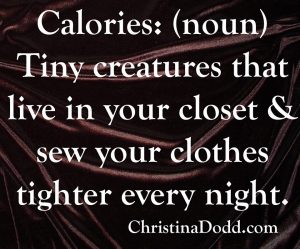Recently I saw this picture on Facebook:

Ah, calories, those evil little feckers, hiding in our food and our wardrobes, trying to make us fat. We’re taught to count them from a very young age, often with a view to taking in as few of them as possible and, preferably, somehow burning off even more of them than we take in. Many of never even learn what a calorie is, only that we’re supposed to avoid them as much as possible. We learn that ‘good’ food (i.e. diet food) has fewer calories than ‘bad’ food. I once heard a young woman ask, in tones of horrified incredulity, “Is there calories in FRUIT?” You can see where she was coming from: Fruit is good for you, and calories are baaaaad! How could there be calories in fruit?!
But, of course, there are calories in fruit, as there are in all foods. (In fact, for the most part it’s a pretty good rule of thumb that if something has no calories in it, it’s not food.) So what is a calorie? Simply put, a calorie is a unit of energy, just like an inch is a unit of distance. Like inches, calories are no longer widely used for scientific purposes. The SI unit of energy is the joule (J). However, in everyday language, many English-speakers (at least here in Ireland anyway) use the term ‘calorie’ when we are talking about a unit of energy in food. In fact, there is another layer of complexity here: Typically, nutrition labels give us the amount in kilocalories and kilojoules. A kilocalorie is 1000 calories, just like a kilometre is 1000 metres.
All of these terms are ways of of talking about the amount of energy in something. But what do we mean by ‘energy’ in this context? Back in school, I memorised the definition “Energy is the ability to do work.” The word ‘energy’ comes from the Greek ‘energeia’, which literally means ‘being at work’ (thanks, grad school Aristotle class!). It seems to me that, in the most general terms, ‘work’ means causing something to change. So producing heat is ‘work’ in the sense that it makes the air around you warmer. But our conventional understanding of ‘work’ also comes under this definition: If, for example, you lift a bucket of water up off the ground, you’re doing work because you’re overcoming the force of gravity and making the bucket move in a way it wouldn’t do if it was left to its own buckety devices. The force of gravity is actively holding the bucket on the ground, so it takes work to overcome that force and change the situation. This work takes energy. For humans, like all animals, this energy is comes from food.
The calories on the nutrition label are telling us how much work the food will theoretically enable us to do. Different kinds of food have different amounts of energy in them, because they have different ratios of fats, carbohydrates and proteins. Fats are the best at storing energy, so foods that are high in fat have a lot of energy packed into a small portion. Carbohydrates (including sugars) are also able to store quite a lot of energy, though they don’t manage to pack it in quite as densely as fats. So, for example, a strawberry might have only one tenth the amount of energy contained in a chocolate even if the two are exactly the same size, because the chocolate has much more fat in it.
But, wait!There’s more! We don’t all convert food into energy in the same way. For one thing, not all our digestive systems work at the same level of efficiency. Some of us are able to absorb more energy from our food than others. And, of the energy we do absorb, some of us are genetically predisposed to use it up quickly in short term work, while others are more inclined to store it away in our fat cells for future use.
Then there’s the fact that different bodies need different amounts of food intake just to keep ticking over, leaving aside any exertion. We often associate ‘burning calories’ with exercise, but the majority of the energy your body needs is just for staying alive. Even when we’re asleep, our bodies are still doing lots of work performing various jobs like breathing and repairing damaged cells, as well as generating heat, which different bodies also do at different rates. The amount of energy your body needs to do this basic ‘staying alive’ work is referred to as your ‘basal metabolic rate’ (BMR). It is difficult to measure an individual’s BMR accurately, but you can get a rough estimate of your BMR by using the Harris-Benedict equation, or one of the more recent variations of it. A version of the Harris-Benedict equation is often used as a basis for estimating how many calories a person needs to eat in order to maintain, increase or decrease her weight. But it only gives a very general guideline because not every body converts food into work at the same rate of efficiency. Two people of the same height and weight can have very different BMRs, for example, if one is more muscular than the other. This means that two outwardly similar people could eat the same diet and do the same exercise and yet end up experiencing quite different effects on their weight.
All this means that the calorie content listed on a nutritional label is really only a rough estimate of how much energy the food might give you, depending on how close you are to average in terms of how you absorb and use up energy from your food. It’s important to remember though, that while calorie content might give you an idea of the quantity of energy in food, it tells you absolutely nothing about quality. To listen to a lot of diet talk or food marketing, you could be forgiven for thinking that low-calorie is the same thing as ‘healthy’ when it comes to food. The way calories get demonised sometimes, you’d think if we all consumed nothing but Diet Coke we’d live forever. But that’s obviously rubbish. The way a lot of ‘diet’ foods are marketed seems to me analogous to the following scenario:
I’m in the market for a new car so I head to my nearest dealership.
Me: I need a new car.
Car Salesperson: How long do you want it be? Say, from headlights to brake lights. Four metres? Four and a half?
Me: Eh, that’s not my primary concern, I want fuel efficiency, comfort, safety features …
Salesperson: Cos we have some very short cars.
Me: Honestly, I’m really not that worried about how long the car is. I’m more concerned about …
Salesperson: BUY A SHORT CAR OR YOU’RE A BIG FATTY STUPIDHEAD.
Me, backing slowly away: Oooooh…kay..
I mean, the length of the car is not irrelevant. It is useful information. Especially since my parallel parking skills are not great.

But the length of the car is by no means the most important criterion on which to choose a car. Similarly, for me, knowing the calorie content of food is useful, but it is by no means the most important piece of information I want to know about any food I’m going to eat. Personally, I sometimes count calories as a quick and dirty way of estimating whether I am eating too much or too little in a given day. This can be handy if I’m eating out, or eating meals I wouldn’t normally eat for some reason. I don’t generally want to be eating too little or too much if I can help it. But it’s very difficult to get the quantities exactly right, and counting calories is only ever a rough guide.
On the other hand, if I focus on quality and make sure I’m getting a good balance of macro- and micro-nutrients, it’s much less likely that my quantities will be way off. To go back to my friend’s incredulous question, yes, there are calories in fruit. Fruit has a lot of sugar (in the form of fructose), and sugar is very high in energy, which is just another way of saying it has a lot of calories. But fruit is, on the whole, other things being equal, really good for you, not just for its vitamins and minerals but also for its sugar, its calories. We need those calories, not only to do what we think of as work, but even just to stay alive. Calories are not the enemy. They are not bad things in food that make you fat, and they are not imps living in your wardrobe making your clothes tighter. In fact, like weight or Body Mass Index or so many other concepts that get thrown around in discussions of fat and health, they’re not actually things at all. They’re just measurements of things. To get the most use out of a measurement, it helps to know what it is a measurement of and how that measurement fits in to your overall project. In terms of healthy eating, I happily admit that calories count, but with the caveat that there’s much more to healthy eating than counting calories.
